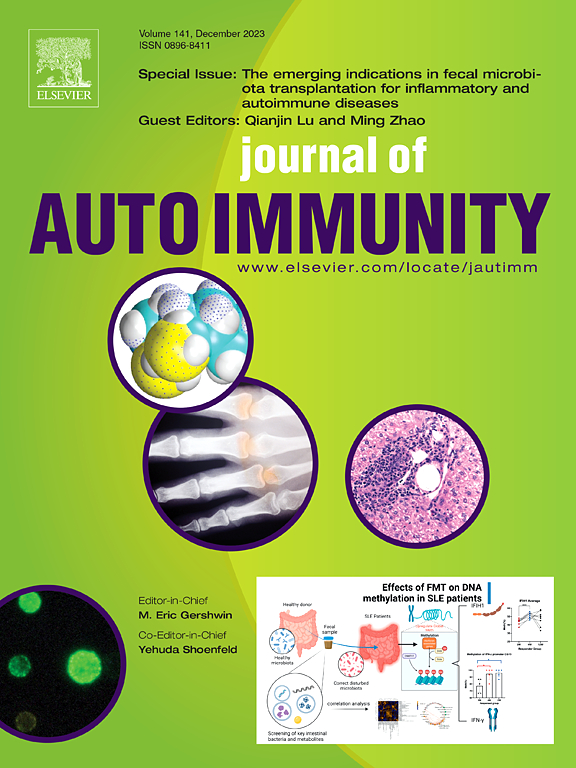PTPN2单倍体不足与患者微生物组的相互作用促进小鼠自身免疫性关节炎
IF 7
1区 医学
Q1 IMMUNOLOGY
引用次数: 0
摘要
在类风湿关节炎(RA)和幼年特发性关节炎(JIA)患者中观察到肠道生态失调,然而,它如何与其他环境和遗传风险因素相互作用促进疾病仍不清楚。在这里,我们通过诱导甘露聚糖诱导的无细菌PTPN2+/+和PTPN2单倍不足(PTPN2+/−)SKG小鼠的关节炎,评估肠道生态失调与RA/ jia相关PTPN2基因单倍型功能丧失之间的相互作用。甘露聚糖诱导的关节炎和淋巴结T细胞免疫表型在无菌PTPN2+/+和PTPN2+/ - SKG小鼠中是相同的。虽然在接受RA肠道微生物群的PTPN2+/+小鼠中,关节炎严重程度没有差异,但两种微生物组(RA#02和RA#86)增强了PTPN2+/ -小鼠的关节炎。RA患者微生物群受体小鼠的微生物组完全按患者来源聚集,发现RA#86微生物组携带显著扩增的普雷沃氏菌属,这与RA生态失调有关。RA#86微生物群受体PTPN2+/−小鼠选择性地表现出关节gmcsf表达增加和关节中CD4+ rr γ T +FoxP3−T细胞的扩增,而在甘露糖后粪便样本中没有增加肠道炎症、肠道屏障渗漏或copri扩增的证据。单定殖copri可增强PTPN2+/−与PTPN2+/+小鼠的关节炎和CD4+ r γ T +FoxP3−T细胞扩增。我们的数据支持目前关于copri促进自身免疫性关节炎的观点,并表明其致病性可以通过与益生菌环境和增强肠道黏膜免疫反应的危险因素相互作用而放大。本文章由计算机程序翻译,如有差异,请以英文原文为准。
Interaction between haploinsufficiency of PTPN2 and patient microbiome promotes autoimmune arthritis in mice
Gut dysbiosis is observed in patients with rheumatoid arthritis (RA) and juvenile idiopathic arthritis (JIA), however, how it promotes disease in interaction with other environmental and genetic risk factors remains unclear. Here we assessed interactions between gut dysbiosis and RA/JIA-associated loss of function haplotypes of the RA/JIA-associated PTPN2 gene by inducing mannan-induced arthritis in germ-free PTPN2+/+ and PTPN2 haploinsufficient (PTPN2+/−) SKG mice reconstituted with fecal microbiota from six patients with seropositive RA. Mannan-induced arthritis and lymph node T cell immunophenotypes were identical in germ free PTPN2+/+ vs PTPN2+/− SKG mice. While no difference in arthritis severity was seen among PTPN2+/+ mice recipient of RA gut microbiota, two microbiomes (RA#02 and RA#86) enhanced arthritis in PTPN2+/− mice. The microbiome of RA patient microbiota recipient mice exclusively clustered by patient of origin and the RA#86 microbiome was found to carry a significant expansion of Prevotella genera, which is associated with RA dysbiosis. RA#86 microbiota-recipient PTPN2+/− mice selectively displayed increased joint GM-CSF expression and an expansion of CD4+RORγt+FoxP3− T cells in the joints, without evidence of increased intestinal inflammation, gut barrier leakage or expansion of P. copri in post-mannan fecal samples. Monocolonization with P. copri caused enhanced arthritis and CD4+RORγt+FoxP3− T cells expansion in PTPN2+/− vs PTPN2+/+ mice. Our data support current views about P. copri promotion of autoimmune arthritis and suggest that its pathogenicity can be amplified via interaction with a dysbiotic context and risk factors that enhance gut mucosa immune responses.
求助全文
通过发布文献求助,成功后即可免费获取论文全文。
去求助
来源期刊

Journal of autoimmunity
医学-免疫学
CiteScore
27.90
自引率
1.60%
发文量
117
审稿时长
17 days
期刊介绍:
The Journal of Autoimmunity serves as the primary publication for research on various facets of autoimmunity. These include topics such as the mechanism of self-recognition, regulation of autoimmune responses, experimental autoimmune diseases, diagnostic tests for autoantibodies, as well as the epidemiology, pathophysiology, and treatment of autoimmune diseases. While the journal covers a wide range of subjects, it emphasizes papers exploring the genetic, molecular biology, and cellular aspects of the field.
The Journal of Translational Autoimmunity, on the other hand, is a subsidiary journal of the Journal of Autoimmunity. It focuses specifically on translating scientific discoveries in autoimmunity into clinical applications and practical solutions. By highlighting research that bridges the gap between basic science and clinical practice, the Journal of Translational Autoimmunity aims to advance the understanding and treatment of autoimmune diseases.
 求助内容:
求助内容: 应助结果提醒方式:
应助结果提醒方式:


